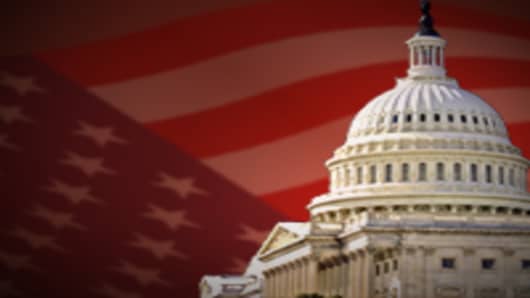Americans are skeptical that the mid-term elections will produce much change in Washington—and one reason is their own resistance to deep cuts in federal spending and deficits.
A new NBC News/Wall Street Journal poll shows that three in four expect “just some” or “not that much” after a campaign verdict that gave Republicans control of the House and a stronger hand against President Obama in the Senate.
Though 60 percent embrace the idea of divided government in Washington, poll respondents by more than three to one predict a period of renewed division in which the two parties show little willingness to compromise.
Democratic pollster Peter Hart, who conducts the Journal/NBC survey with Republican counterpart Bill McInturff, called the public mood “resigned realism.” And there’s no better illustration than attitudes over steps to curb federal budget deficits.
In the survey, two-thirds of the public said support for spending cuts was a major reason they decided to back the Congressional candidates they chose in this year's elections. Yet a 40 percent plurality called the proposal recently offered by the co-chairs of a presidential deficit reduction panela “bad idea.”
Moreover, opposition was substantially higher to specific steps the co-chairs recommended. Seven in 10 Americans called themselves “somewhat uncomfortable” or “not comfortable at all” with the idea of reducing the deficit by cutting spending on Social Security, Medicare and defense programs.
Six in 10 said the same about the idea of increasing gasoline taxes, limiting home mortgage interest deductions, or raising corporate taxes. Nearly six in 10 expressed discomfort with raising the Social Security retirement age to 69—even if the change were phased in over 60 years.
Opposition to such steps was strongest among core Republican partisans, those without college educations, and African-Americans, among other groups. Groups expressing the strongest support included college graduates and those with incomes above $75,000.
Hart and McInturff observed that the national debate about deficit reduction is only now beginning in earnest, and those attitudes may change if the White House and Congress pursue serious policy changes. But changing them substantially may require significantly boosting public confidence in the fairness of the effort.
For now, Hart noted, “They’re afraid that they’re going to be asked to share an unfair part of the burden.” The telephone survey of 1,000 adults, conducted Nov. 11-15, carries a margin for error of 3.1 percentage points.
The survey indicates that Americans want the Congress they just elected to take the first steps in a new direction. By 52 percent to 39 percent, poll respondents said they want Congress rather than Obama to take the lead role in setting policy.
Public opinion on tax policy doesn’t offer any reliable guide to lawmakers. Some 10 percent want to eliminate all the Bush tax cuts, 39 percent want to eliminate them for Americans earning more than $250,000 a year, 23 percent want them made permanent for all, and 23 percent want them extended temporarily for all.
One bright spot is rising public confidence on the economy. Some 37 percent now expect the economy to improve over the next year, up from 32 percent in September and 26 percent in August. About the Great Recession, 60 percent said “the worst is behind us”, up from 45 percent in August.
Despite complaints from many corporate executives, however, most Americans are not urging Obama to become friendlier to the business community. Some 59 percent called Obama’s policies toward business either “about right” or “too pro-business,” compared to 36 percent who called the president “too anti-business.”



